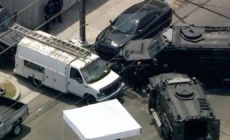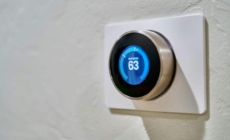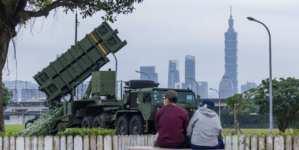-
Man sentenced for fatally shooting couple in front of grandson over car deal gone wrong - 5 mins ago
-
Geoff Schwartz on Caitlin Clark & If Hurts deserves better in rankings | FULL INTERVIEW | The Herd - 9 mins ago
-
Police fatally shoot man allegedly armed with a rifle in Boyle Heights - 15 mins ago
-
Supreme Court Gives Donald Trump Another Big Win - 34 mins ago
-
Pennsylvania woman allegedly attacked her boyfriend with a cleaver - 48 mins ago
-
2024 INDYCAR Rookie of the Year Linus Lundqvist On Standby For Nolan Siegel - 52 mins ago
-
Trump administration seeks to lift limits on SoCal immigration raids - 54 mins ago
-
Taiwan Deploys HIMARS, Patriot, Stinger Weapons in China Invasion Exercise - about 1 hour ago
-
The pros and cons of power saver programs - about 1 hour ago
-
Serial killer confesses murders to daughter; Air Force veteran’s secret male escort life revealed - 2 hours ago
Can Donald Trump Override Joe Biden’s Pardons? Experts Weigh In
People issued with pardons by President Joe Biden might still be indicted by the Trump administration, a former federal prosecutor has said.
Newsweek sought email comment from the White House on Friday.
Why It Matters
Trump has vowed several times to indict his political enemies, including Republican Liz Cheney and other members of the January 6 committee.
If he can get around Biden’s preemptive pardoning of the January 6 committee, it could throw the U.S. into a massive constitutional crisis.
Kevin Dietsch/Getty Images
What To Know
The House January 6 committee firmly blamed Trump for the riot at the Capitol on January 6, 2021, and its final report said that Trump had engaged in a “multipart conspiracy” to overturn the result of the 2020 election. Trump had vowed revenge, leading President Joe Biden to preemptively pardon the committee members. These included Adam Schiff (D-Calif.), Liz Cheney (R-Wyo.), Adam Kinzinger (R-Ill.) and Elaine Luria (D-Va.).
Speaking on the Stay Tuned With Preet Bharara podcast, which she cohosts, former federal prosecutor, Joyce Vance, said on January 21 that Trump could possibly indict anyone who hasn’t accepted Biden’s pardon while Biden was still in office.
“If I was the Trump administration and if I was hell-bent on prosecuting these folks, I would make the argument that the pardon must be accepted while the person who issues it is still in office and that if you don’t affirmatively accept it, it’s not valid,” she said.
“It’s speculative,” she added. “There is no precedent for it, there’s no precedent against it. This whole area is wide-open.”
“If Trump really wants to go after these people, maybe he’ll do it,” she said.
What People Are Saying
Andrew Novak, a law professor at George Mason University in Virginia and author of “Comparative Executive Clemency: The constitutional Pardon Power,” told Newsweek he didn’t think Trump would be able to oversee Biden’s pardons: “I think this is made up nonsense. It is true that a pardon could probably be rejected in some situations, such as where the conditions on a conditional pardon are onerous and the pardon recipient would rather take the punishment. That goes back to United States v. Wilson by John Marshall in 1833.
“But it does not follow that a pardon has to be affirmatively accepted to be valid. And even if that were the case, I don’t see why a change in presidential administration would make any difference. This is a power of the office; it’s not some personal right of the individual. Joyce Vance must think that no last minute pardons are valid, but there’s a long precedent of that too, and I’m not clear what the alternative would be. Everyone must accept a pardon within 24 hours or it disappears? There’s no historical precedent for any such thing.”
Greg Germain, a law professor at Syracuse University in New York, agreed that Trump cannot override Biden’s pardons, telling Newsweek: “It’s one thing to say a pardon cannot be forced on someone who rejects it. It’s quite another to say it can be rescinded by a later president. Once granted, it’s effective unless rejected by the person pardoned. Presumably, the pardons were delivered, and were not rejected, so they would be final.”
Peter Shane, a constitutional law professor at New York University, told Newsweek that the recipient does not have to accept the pardon for it to be valid: “I believe the ordinary rule would be that a discretionary presidential act takes effect when the relevant document is executed. As far as I know, there is no act of acceptance required to make the pardon complete. [An act of acceptance] would make posthumous pardons impossible, and they are routine,” he said.
What Happens Next
With the January 6 committee covered by a preemptive pardon, it is unlikely that Trump will be able to indict them. However, there are many other people that Biden has not preemptively pardoned, that could become targets.
These include those involved in indicting Trump on federal election interference charges in Washington, D.C, a case that ended in failure after Trump was elected president in November, 2024.
Source link






























